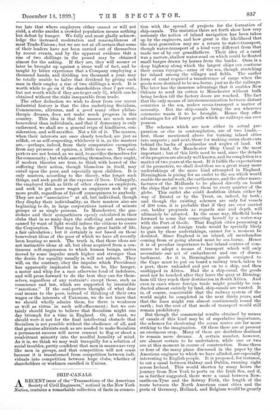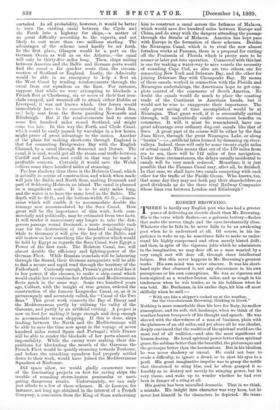SHIP-CANALS.
ARECENT issue of the "Transactions of the American Society of Civil Engineers," noticed in the New York _Nation, contains a remarkable collection of facts in connec- tion with the spread of projects for the formation of ship-canals. The statistics there set forth show how very seriously the notion of inland navigation has been taken up by the engineers, and how great is the likelihood that the next generation may see a return to water-transport, though water-transport of a kind very different from that made use of by our grandfathers. Their idea of a canal was a narrow, shallow water-road on which could be floated small barges drawn by horses from the banks. Ours is a deep highway along which the largest ships can continue their ocean voyages,—arms of the sea, though stretching far inland among the villages and fields. The earlier form of canal required a transference of cargo when the goods were destined to be sea-borne, just as do the railways. The later has the immense advantage that it enables New Orleans to send its cotton to Manchester without bulk being broken till the factory doors are reached. The fact that the only means of intercommunication between distant countries is the sea, makes ocean-transport a matter of necessity. But the ship-canals bring the sea wherever commerce wants it to be brought. Hence they offer advantages for all heavy goods which no railways can ever possess. The schemes which are now either in actual pre- paration or else in contemplation, are of two kinds,— first, those mentioned above for turning inland cities into seaports ; and next, those for making ocean short-cuts behind the backs of peninsulas and angles of land. Of the first kind, the Manchester Ship Canal is the most important ; but of this little need be said, since the details of its progress are already well known, and its completion is a matter of two years at the most. If it fulfils the expectations of its promoters, we shall doubtless see a great many more undertakings of the same kind attempted in England. Birminghm is pining for an outlet to the sea which would enable the metal work, the earthenware, and the other manu- factures of the Midlands to be placed directly on board the ships that are to convey them to every quarter of the globe. This outlet she could doubtless obtain either by way of Bristol or by the Trent, or, indeed, by both ; and though the existing schemes are only for vessels of 200 tons, it is probable that if they are ever carried out, bolder proposals as regards size and depth will ultimately be adopted. In the same way, Sheffield looks forward to some day connecting herself-by a water-way with the Port of Goole. That English cities possessing a large amount of foreign trade would be specially likely to gain by these undertakings, cannot for a moment be doubted. Since England is an island, all merchandise coming from or going abroad must be sea-borne. Hence it is of peculiar importance to her inland centres of com- merce to adopt a means of transport which will only necessitate one act of embarkment and one of disem- barkment. As it is, Birmingham goods consigned to the Cape must be put on board a railway truck, taken to a port, there unloaded and put on to a ship, and then unshipped in Africa. Had she a ship-canal, the goods need not be touched after they leave the quay at Birming- ham till they reach their destination in South Africa. And even in cases where foreign trade might possibly be con- ducted almost entirely by land, ship-canals are wanted. It is, of course, conceivable that the railway system of the world might be completed in the next thirty years, and that the lines might run almost continuously round the earth ; but the cost of that mode of transport would still remain prohibitory. But though the commercial results obtained by means of canals of this kind may be of superlative importance, the schemes for shortening the ocean routes are far more striking to the imagination. Of these there are at present an enormous crop. Many of them are doubtless destined to remain mere dreams. A certain number, however, are almost certain to be undertaken, while one or two are at this moment in course of construction. Some three or four of the many plans discussed in the paper by the American engineer to which we have alluded, are especially interesting to English people. It is proposed, for instance, to cut a canal between Galway and Dublin, running right across Ireland. This would shorten by many hours the journey from New York to ports on the Irish Sea, and if, as is further suggested, there were a canal between New- castle-on-Tyne and the Solway Firth, the length of the route between the North American coast cities and the ports of Germany, Holland, and Belgium would be greatly curtailed. In all probability, however, it would be better to turn the existing canal between the Clyde and the Forth into a highway for ships,—a matter of no great difficulty according to the experts, and not likely to cost more than two millions sterling. The advantages of the scheme need hardly be set forth. In the first place, Glasgow would be a port on the German Ocean as well as on the Atlantic,—the canal will only be thirty-five miles long.. Then, ships sailing between America and the Baltic and German ports would find the canal a far quicker route than the circum- vention of Scotland or England. Lastly, the Admiralty would be able in an emergency to help a fleet on the West Coast by sending reinforcements through the canal from our squadron on the East. For instance, suppose that while we were attempting to blockade a French fleet at Cherbourg, six or seven of their fast iron- clads escaped, and steamed off to attack either Dublin or Liverpool, it was not known which. Our forces would immediately have to be concentrated in the Irish Sea, and help sent from the fleets guarding Newcastle and Edinburgh. But if the reinforcements had to steam some five hundred miles round Scotland, aid might come too late. In this way the Forth and Clyde Canal, which could be easily passed by war-ships in a few hours, might prove of great advantage to the nation. Another of the plans for making short-cuts through England is that for connecting Bridgewater Bay with the English Channel, by a canal through Somerset and Dorset. The canal, it is said, would get all the steam-coal traffic between Cardiff and London, and could in that way be made a profitable concern. Certainly it would save the Welsh colliers some three hundred miles of steaming.
Far less shadowy than these is the Holstein Canal, which is actually in course of construction, and which when made will join the Baltic and North Seas, making Denmark and part of Schleswig-Holstein an island. The canal is planned on a magnificent scale. It is to be sixty miles long, and the water is to have the same level as the Baltic. The depth will be 28 ft., and the bottom-width 85 ft.,—dimen- sions which will enable it to accommodate double the tonnage now accommodated by the Suez Canal. How great will be the importance of this work, both com- mercially and politically, may be estimated from two facts. It will render it unnecessary any longer to take the dan- gerous passage round Denmark, a route responsible each year for the destruction of two hundred sailing-ships ; while to Germany it will give the key of the Baltic, and will bestow on her something like the position which would be held by Egypt as regards the Suez Canal, were Egypt a Power of the first rank. The Holstein Canal, too, will almost double the efficiency and fighting-power of the German Fleet. While Russian ironclads will be labouring through the Sound, their German antagonists will be able to find a secure and rapid road through the territory of the Fatherland. Curiously enough, Prussia's great rival has it in her power, if she chooses, to make a ship-canal which would enable her to combine her Atlantic and Mediterranean fleets much in the same way. Some two hundred years ago, Colbert, with the insight of true genius, ordered the construction of the famous Languedoc Canal, or, as it is picturesquely and accurately called, the " Canal of the Two Seas." This great work connects the Bay of Biscay and the Mediterranean partly by utilising the valley of the Garonne, and partly by an artificial cutting. A project is now on foot for making it large enough and deep enough to accommodate ocean shipping. If this is done, ships trading between the North and the Mediterranean will be able to save the time now spent in the voyage of seven hundred miles round Spain and Portugal ; while France will be able to render the blockade of her ports almost an impossibility. While the enemy were making their dis- positions for blockading the mouth of the Garonne, the French Fleet would be quietly steaming towards Toulouse, and before the attacking squadron had properly settled down to their work, would. have joined the Mediterranean Squadron at Narbonne.
Did space allow, we would gladly enumerate more of the fascinating projects on foot for saving ships the trouble of rounding storm-beaten peninsulas or navi- gating dangerous straits. Unfortunately, we can only just allude to a few of these schemes. M. de Lesseps, for
instance, not long ago obtained in the interest of a French
Company, a concession from the King of Siam authorising him to construct a canal across the Isthmus of Malacca, which would save five hundred miles between Europe and China, and do away with the dangers attending the passage through the Straits of Malacca. America has kept pace with Europe in the formation of these schemes. Besides the Nicaragua Canal, which is to rival the now almost forsaken works at Panama, there is a proposal for cutting off the Peninsula of Florida which is pretty sure to be sooner or later put into operation. Connected with this last is one for making a water-way to save vessels the necessity of rounding Cape Cod, as also are two others, one for connecting New York and Delaware Bay, and the other for joining Delaware Bay with Chesapeake Bay. By means of these canals, worked in connection with the Florida and Nicaragua undertakings, the Americans hope to get com- plete control of the commerce of South America. No doubt the canals would do much to place the coasting trade of the Continent in American hands, but it would not be wise to exaggerate their importance. The only great saving of time accomplished would be at Nicaragua. That great work, if it is successfully carried through, will undoubtedly confer enormous benefits on commerce. It will, it must be remembered, have one great advantage over ordinary dug-out canals like that of Suez. A great part of its course will be either by the San Juan River, through the great Nicaragua Lake, or along " basins "—i.e., artificial lakes formed by damming up river- valleys. Indeed, there will only be some twenty-eight miles of actual canal. This means that out of the 170 miles from sea to sea, there will be 142 miles of free navigation. Under these circumstances, the delays usually incidental to canals will be very much reduced. Meantime, it is just possible that the Panama Canal may, after all, be finished. In that case, we shall have two canals competing with each other for the traffic of the Pacific Ocean. Who bknows, too, that some day they may not both pay their shareholders as good dividends as do the three rival Railway Companies whose lines run between London and Edinburgh ?











































 Previous page
Previous page